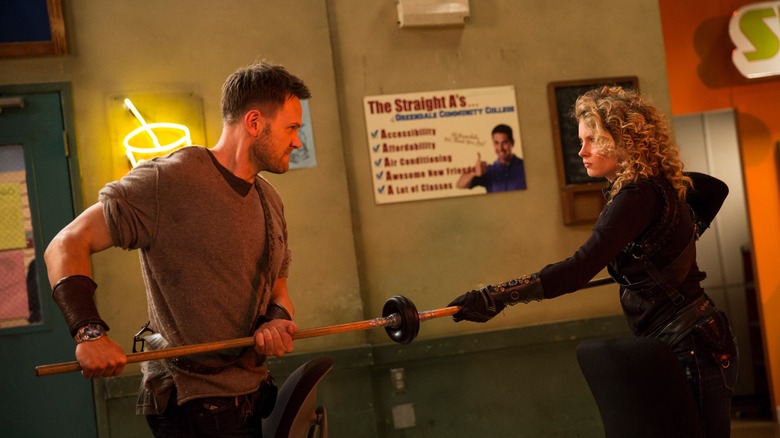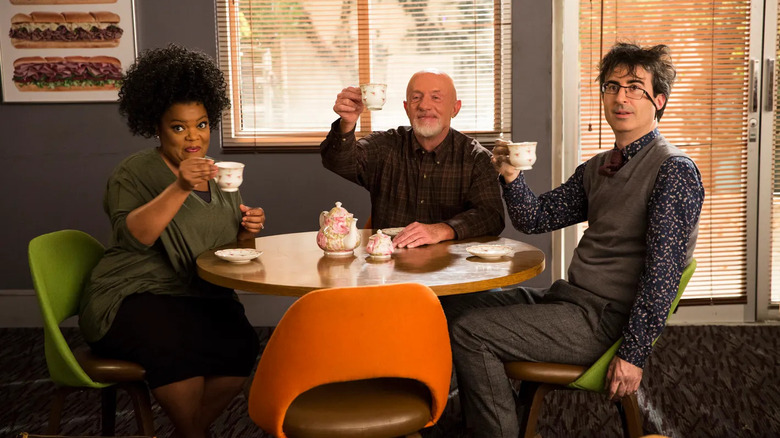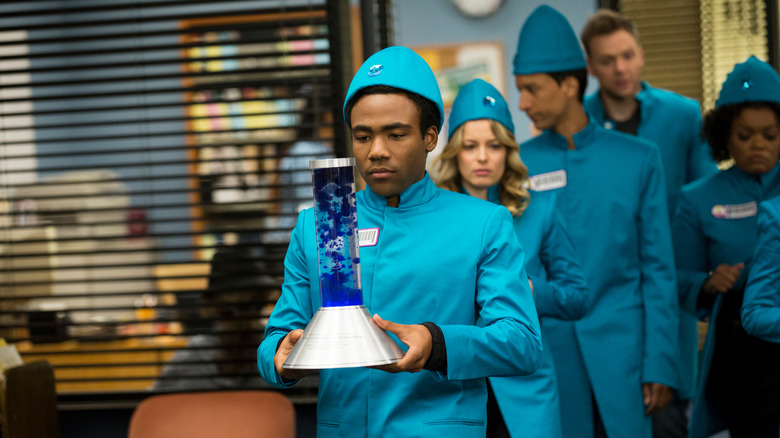Why Season 5 Is The Most Impressive Season Of Community
If I were to rank the seasons of "Community," I'd probably put season 2 at the top, followed by season 5, then 3, then 1, then 6, then 4. For the most part, this isn't a controversial ordering. Most fans agree that season 4, the only season without showrunner Dan Harmon on board, lacked the sharpness or creativity of the rest of the show. They'd also usually admit that by season 6, the sheer number of departed cast members had finally taken its toll. And while nobody usually straight-up dislikes season 1, it definitely suffered from those early jitters that most sitcoms have to deal with. As even the cast members will tell you, it wasn't until around the Halloween episode that "Community" really started to become "Community."
The only real controversy within that ranking is season 5, which I placed above the beloved season 3. Most fans consider seasons 2 and 3 to be the golden age of the show, with a level of consistency and creativity that the rest of the series never quite managed to reach. Season 5 was a return to form, most will admit, but it was too little too late. Most of the audience's goodwill had been lost after season 4, and the season also had to deal with the early departure of Pierce (Chevy Chase) and subsequently Troy (Donald Glover). And much like the seasons surrounding it, 5 was only thirteen episodes, so it didn't have any of those beloved Halloween or Christmas-themed episodes that made the early seasons so fun.
All things considered, season 5 should've been a total disappointment. Yet somehow, despite the odds, it managed to have the strongest run of episodes in the series.
The lovely Buzz Hickey and Professor Duncan
With Troy and Pierce on their way out, the show needed characters to fill their place in the group. This is something so many sitcoms have struggled to do, and it rarely goes down well. Randy in "That '70s Show" came in to replace Eric in the final season, and everyone hated him. When "Family Guy" tried to replace Brian with Vinny, it didn't go down well either.
Meanwhile, I've never known a "Community" fan who didn't love Buzz Hickey (Jonathan Banks), who took Pierce's role as the resident old person. Much like Pierce, Buzz is cranky and resistant to change. But unlike Pierce, Hickey is rarely a villain to the group, nor is he ever characterized as pathetic. He still works as a foil to the other characters, but it all feels a lot less mean-spirited.
And then there's Duncan, a character who'd been around for a while. Because John Oliver was (and is) a busy man, his screen time on the show was always limited, which meant he was in a unique position of being both familiar while still feeling like a fresh, exciting character. Duncan has many memorable qualities, most notably being British, being sleazy, and being an alcoholic. Yes, he might also be the Ass Crack Bandit, but let's give him the benefit of the doubt for now.
But the smartest thing "Community" does is introduce Hickey the episode before Pierce dies, and introduce Duncan two episodes before Troy leaves. It helps to downplay the fact that these are replacement characters, letting the audiences view them on their own terms, not as Pierce #2 and Troy #2. It makes the inevitably jarring transition feel smoother than anyone could've hoped.
It's Britta's best season
I've written a lot at this point about how Britta's characterization was all over the place throughout the series. In season 1, she was a mostly cool, intelligent person, and by season 6 she was a dumb loser who everyone seemed to hate. One of the reasons I rank season 5 above season 3 is that season 3 is incredibly mean to Britta. It leads to plenty of funny moments, but most of the time it's just kind of sad, and a little lazy.
Say what you want about season 5, but it's one of the few periods of the show where Britta isn't dunked on by everyone. In Pierce's posthumous farewell, he tells Britta, "Do you know that you hate yourself more than you should, and that your passion inspired me?" In the MeowMeowBeenz™ episode, Britta is pretty much 100% right about why the app is bad, and she successfully runs a revolution at the end to overthrow the school's absurd class hierarchy. Her standout episode is probably "Geothermal Escapism," in which she wins the lava game because she wants to make sure Abed is properly dealing with Troy's departure.
The episode's not just great because it actually takes Britta's concerns seriously, but because it's the first spectacle episode in a while where she gets to be competent. Britta was a badass in the first paintball game, but by the time we get to the pillow war in season 3 she's just a klutz on the sidelines trying and failing to get a good photograph. In season 6's paintball game, Britta's getting called sloppy by Elroy (who has literally never played before), and the show takes Elroy's side. With that in mind, season 5 Britta is a breath of fresh air.
The special episodes are good again
One of the most hated episodes of "Community" is season 4's "Intro to Felt Surrogacy," otherwise known as the episode where the characters got to be puppets. I personally liked the episode (the songs were catchy!) but it's admittedly not very well-written. It's a story that's all about the gimmick. Whereas season 2's "Abed's Uncontrollable Christmas" had a clear, anchoring emotional core underneath the claymation, with the puppet episode you get the feeling that the writers just wanted to have a puppet/musical episode and didn't think it through much further.
Compare that to season 5's "G.I. Jeff," which takes its ridiculous premise — Jeff's in a coma and imagining he's a "G.I. Joe" character— and grounds it in something real and well-established. Jeff has always been insecure about his age, and he's always been conflicted about the idea of being stuck inside Greendale forever. Although Jeff clings to the stability of Greendale in the series finale, throughout the later seasons we're constantly seeing Jeff struggle with the fact that the old Jeff would hate him. He'd have been devastated to learn that he'd one day be indefinitely working at Greendale as a teacher, and this is what "G.I. Jeff" is all about.
This is true for all the high-concept episodes this season. The Ass Crack Bandit episode is about re-examining Jeff and Annie's relationship. "Geothermal Escapism" is about the group coping with Troy's departure. "Advanced Advanced Dungeons & Dragons" is about Hickey trying to fix his troubled relationship with his son. These special episodes have a thoughtfulness to them that was lacking throughout most of season 4. It often feels like we're watching Dan Harmon say to the season 4 showrunners, "This is how it's done."
The show's most impressive string of episodes
More than anything, season 5 is a season full of sequels, be them direct (like the Dungeons & Dragons episode) or spiritual, like "Cooperative Polygraphy." That one's the episode where Pierce's will dictates that the rest of the study group be interrogated to determine if any of them were responsible for his death. It seems like a completely standalone story, but it's basically a second run at the concept behind the puppet episode, in which the characters all had to reveal their supposedly deepest, darkest secrets to one another.
The secrets in the puppet episode were mostly pretty lame and underwhelming. Britta's big shameful secret is that she's never voted, and Pierce's secret is that he never slept with Eartha Kitt. Meanwhile, "Cooperative Polygraphy" feels like a newly-returned Harmon taking another shot at the same concept, except this time making sure the secrets were genuinely juicy.
But maybe what's most impressive about this episode is that's surrounded by two equally beloved episodes, the Ass Crack Bandit one and the Floor is Lava one. The two episodes preceding it ("Repilot" and "Introduction to Teaching") are also some of the strongest opening episodes of nearly any season of the show. Even if you think the second half of the season suffers from a lack of Troy, the first half of the season is impressively consistent in its high quality.
Keeping that energy going
Where most people think season 5 falters is that second Troy-less half, and the show itself seems deeply aware of this criticism. Dan Harmon himself has said that he considers Donald Glover's departure to be the "death of the show," and you can certainly feel Glover's absence straight away.
Season 5 fights valiantly to prove that it can survive perfectly fine without Troy. The show starts experimenting with new character dynamics that genuinely work, like Abed and Hickey, and it brings back old, seemingly forgotten character pairings like Jeff and Duncan. It's probably why there are so many big, high-concept episodes in the season, too; it gets easier to forget that Troy's gone for good when you're watching the show do a "Black Mirror" concept before "Black Mirror" even got around to it.
But the reason season 5 doesn't make it to the top of my ranking of "Community" seasons is that it doesn't completely succeed in moving past Troy. With the somewhat hollow two-part finale, in particular, it's clear there's still a Troy-shaped hole at Greendale that "Community" would never quite be able to fill. (Perhaps they'll pull it off in the movie.) But what makes season 5 so impressive is how hard it fights against that inevitable feeling that the show's death is on the horizon, and how effectively it's able to maintain the illusion that the show still has plenty of life left in it.
Season 5 had to deal with two major cast departures, a low budget, low ratings, and an audience that was understandably a little burnt out. It didn't usher in a new golden era of the show or anything, but the fact that it came as close as it did? That's nothing short of a miracle.





